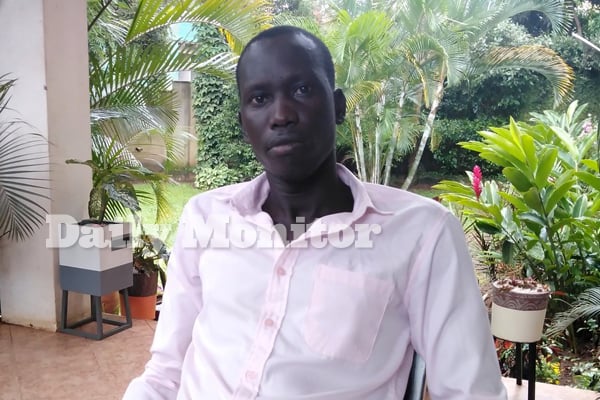Survivor of Masaka accident which left 15 dead contradicts police account

Mr George Odinga. PHOTO/ ANDREW BAGALA
What you need to know:
- Mr Odinga said the unfortunate incident came after Masaka City when the driver was overtaking a trailer.
- “I have learnt to always fasten a seat belt. The second thing is patience. If I had patiently waited for a bus, I wouldn’t have ended up in this situation” ~ Odinga said
A survivor of last Thursday’s accident outside Masaka town, which killed 15 people, has said the driver of their commuter taxi was at fault, contrary to the police narrative that blamed the trailer driver.
The overloaded taxi smashed into a trailer, causing the truck off the road in Kassijjagirwa Village.
Mr George Odinga yesterday told Daily Monitor that he went to Mbarara University of Science and Technology a day before the accident by a bus to pick his admission forms.
After picking the forms, he decided to spend a night in Mbarara City to avoid being caught by curfew along the way.
“I woke up early on Thursday and by around 5am, I had arrived at the bus park. But I found the first bus had left. As I waited, a [taxi] tout came to me and said a taxi was travelling to Kampala,” Mr Odinga said.
“I heard the driver saying he had 13 people in the taxi and just needed one person. I boarded. I occupied the front seat and fastened my seat belt,” he added.
Mr Odinga said the driver stopped twice along the way and picked up two more passengers.
But the driver left the middle seat in the front empty to hoodwink traffic police that the taxi was observing social distancing as a measure to prevent the spread of coronavirus.
A taxi is supposed to carry only eight passengers according to the standard operating procedures.
“In my estimate, there were more than 14 people in the taxi, and many of them seemed to know each other because they conversed about an event they had attended. They kept sharing photographs taken at the event,” he said.
Along the way, Mr Odinga said he started noticing that the driver was impatient. “Every 10 to 20 minutes, he could make calls to someone telling that person where he was and comforting that receiver that he would be in Kampala in a short while,” he said.
The driver would overtake other cars in blind spots, which attracted the attention of the passengers.
“One woman complained about the manner in which the driver was driving us. Other passengers backed her. The driver told them that those who were uncomfortable about the way he was driving should get out. Everyone kept quiet,” he said. The driver didn’t reduce the speed.
Mr Odinga said whenever they approached a police checkpoint, the driver would fasten his seat belt and then unlock it after.
Mr Odinga said the unfortunate incident came after Masaka City when the driver was overtaking a trailer.
“He didn’t want a head-on collision with the bus. In an attempt to fit in the right lane, he knocked the trailer’s rear body. The taxi instantly overturned to the right side,” he said.
“I saw the driver tossed off his seat, hit the front windscreen and landed on the tarmac, then the taxi fell on him. Two other people, who were on the first rear seat were thrown out of the taxi through the window on the second overturn,” the survivor said.
“I was still conscious and could feel hot blood pouring on my body. I must have collapsed thereafter. I became conscious when I was in hospital,” he said.
“Luckily, I had left my identity card in the trouser pocket. The next morning, a medic drove me to the police where my bag was found,” Mr Odinga said, adding that he later called his relatives.
A medical examination found that Mr Odinga was suffering from chest pain caused by the seat belt. Other injuries were found to be non-life threatening.
“I have learnt to always fasten a seat belt. The second thing is patience. If I had patiently waited for a bus, I wouldn’t have ended up in this situation,” he said.




